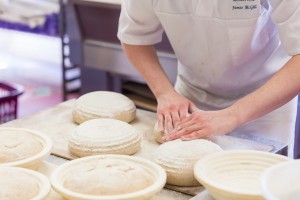The therapeutic benefits of baking bread, from kneading and shaping dough to watching it transform into something that can be shared and enjoyed, are becoming increasingly well-known.
Last year, The Real Bread Campaign released the findings of a pilot study into the mental wellbeing benefits of bread making. Participants said baking made them feel happier and more relaxed, creative and less anxious and had given them a sense of purpose and achievement. [see notes to editors]
Now The School of Artisan Food is bringing together the benefits of baking and mindfulness in its first ever Mindful Bread workshop (8 September 9.30am-2pm).
The course is led by Ian Waterland who has worked in mental health for 28 years before taking the Advanced Diploma of Artisan Baking at the School in 2013. He now runs Knead Good Bread, a successful micro-bakery in Leicestershire and also teaches people with mental health problems and learning disabilities the joys of creating bread.
Ian said: ”Everyone would benefit from mindfulness in today’s modern fast-paced world. Many of us do use it but not consciously or as well as we could. It’s actually an ancient technique. It’s about being present in the moment.
“That’s where making bread comes in. When making bread, you have to use all your senses and stay in the moment. How does it look, taste, smell, is the texture right and so on. I believe that the process of making bread is therapeutic, it is much healthier than buying bread and can be an effective strategy in combating stress and of course, it’s also fun.”
Located in the tranquil surroundings of the historic Welbeck Estate, the workshop will provide the opportunity to learn how to practice techniques such as mindful breathing and talk about the benefits of the technique during the hands on bread baking session where everyone will learn how to make their own mindful bread.
Ian added: “I’ll be using the gaps while the dough is proving or baking in the oven to talk about mindfulness, its history and some techniques that we will be putting into practice. The idea is for people to come away with something they can use when they return to their everyday lives.
“Baking bread is such a transformative process from putting in some pretty anaemic looking dough in the oven to taking out something that has changed colour, shape and smell. It can have a fantastic effect which I have seen in my work with young people with learning disabilities, including some that have no speech. When we are baking, the level of challenging behaviour from these young adults really drops and they gain skills to take out into the wider world as well as gaining a huge sense of achievement.”
No prior experience of mindfulness or baking bread is necessary, just a willingness to work alongside others to make real bread.
For more information, visit www.schoolofartisanfood.org/



